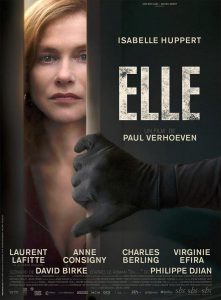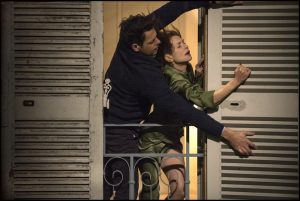
“Elle” is an astute analysis on psychosexuality disguised as a suspenseful thriller. A thriller that follows the travails of Michèle Leblanc (Isabelle Huppert), a successful businesswoman tracking down her rapist. Something is amiss immediately as, following her attack, Michèle gets up, brushes herself off, and dusts up the broken glass caused by the intruder. She goes about her life as if nothing is out of the ordinary; neglecting to inform the police and only casually dropping reference to the incident to her friends. It’s almost as if she got off on it.
That’s the angle Paul Verhoeven is resting on: a dissection on sexual perversion. While the film is framed as a traditional thriller, its approach is anything but. The suspense and intrigue doesn’t come from who the assailant is, but what exactly makes Michèle tick. Hints are thrown in as to who the masked man could be, such as her business partner’s husband that’s seeing her on the side. Their relationship is rough, to say the least, with suggestive dialogue hinting at ulterior motives. Maybe the two get off on punishment roleplaying. If so, why?

Throwing a monkey wrench into the theory are the mysterious messages Michèle has been receiving. These are presented as if sent from a stalker, talking up her tan dress whilst seemingly alone in the office. Anne Dudley’s icy score suggests danger is imminent with Michèle’s trepidation only reinforcing that. Is that all part of her fantasy? Is Paul Verhoeven cleverly toying with the audience’s emotions to highlight the rush Michèle receives from her erotic simulation? Perhaps this is a commentary on our sanguinary desire for thrills, morphing it into a sexual excursion to subvert expectations and challenge the viewer’s morality.
This fascination Verhoeven has in disseminating sexuality is what makes “Elle” so beguiling! As a psychological thriller, it’s rather routine. Red herrings are thrown in just to throw the audience off course, with side characters being awkwardly shuffled off to the side once their purpose is met. The symbolism is too blunt, coming in the form of a bizarre video game that Michèle is developing. It features monsters that graphically rape their victims; gee, I wonder what that could be representing? Even the mentions of her criminal father and rocky relationship with her mother, her son, and her ex are a little too on-the-nose. And yet, they work thanks to Verhoeven’s subtle nuances. Well, except for the video game. That not only houses graphics that would barely pass for a Playstation 2 game (let alone one being released by Activision for the Playstation 4, as noted in the film), but plays host to the most damning of red herrings and obvious symbolism.

Everything else, however, works spectacularly! While David Birke’s screenplay (which is based upon Philippe Dijan’s novel) isn’t discreet about its themes, Verhoeven implements them subtly. Michèle makes mention of her father’s past, but never dwells on it. The information is introduced to give a little insight into her psyche which, from a young age, has been shattered immensely. Her perception of normalcy is drastically different from the norm, abuse playing a heavy factor. It is seemingly passed down to her son, Vincent (Jonas Bloquet), as he fights back fits of rage on numerous occasions. Even her seemingly soft ex, Richard (Charles Berling), makes mention of hitting her once (and deeply regretting it). She brushes that incident off now, believing the two should still be together and uncomfortably obsessing over his new lover. There is so much to gain from the psychology encompassed, grabbing hold of my attention and never letting go.
The marriage between the psychology and suspense doesn’t always mesh well. Those aforementioned red herrings cause the reveal of the masked man to feel underwhelming, despite his identity making sense in the long run. When taking into consideration the implications proposed, one could even argue there’s more layers to the twist than simply the reveal. I’d agree with that argument, with the feeling that the film excels when taking those layers into consideration. They are befitting of the psychosexual analysis on display, explaining why the film doesn’t end at the reveal. It’s not about the shock, but the tantalization. Framing it as a thriller brilliantly played into the perversion, but also presented hurdles that Verhoeven couldn’t quite overcome.

“Elle” may be rough around the edges, but its exploration of sexuality is so enrapturing that it trumps the shortcomings. Michèle’s flirtatious affair with her married neighbor is symbolic of the desensitization of sexuality no matter how it’s framed. Had her rape been legitimate, it’s a commentary on how the loss of innocence robs the pleasure of intimacy. Had it been a morbid fantasy, it’s a commentary on the banality of casual sex and the desire for insatiable lust. Either way works and that’s the twisted beauty of it!
Final Rating: B+
